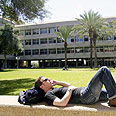
Ben-Gurion Uni changes ethics code over political dramas
After series of embarrassing political statements by staff members, university decides to amend code of ethics, prohibit lecturers from mentioning its name during political public speeches. Staff members also banned from voicing political opinions during classes
In the past year, Ben-Gurion University in Beersheba suffered a series of public statements by staff members which gave it an image of an institution identified with radical ends of the political spectrum.
Following these developments, the university decided to change its ethics code and prohibit lecturers from voicing their political opinions during classes and using the university's name while speaking publicly about politics, Ynet has learned.
One of the most controversial affairs concerns Prof. Neve Gordon from the Political Science Department. Gordon had published an article at the LA Times calling for a boycott of Israel which he described as an "apartheid state."
The new protocol states that "In voicing their political or religious opinions, unlike particular professional views, staff members should refrain from using the Ben-Gurion University's name." The lecturers were asked to clarify they were speaking for themselves and not representing the university's positions.
It was also determined that "staff members are responsible for separating their professional and civic activities. Voicing a partisan stance during a class is strictly prohibited as it may unfairly and indiscernibly influence the students attending the class. The university may regulate the lecturers' partisan and religious remarks, despite the fact they are part of their civic liberties, in order to prevent teaching and research being used for partisan purposes."
A university source told Ynet that the ethics code has been changed since recent months have seen the institution's image being compromised after staff members holding radical opinions used its name in an inappropriate and damaging manner.
'Tables are turning'
The amendments to the code, which were recently approved by the university's senate, prompted outrage among the staff members. "I would like to believe this is an error in judgment by those who phrased the code and were not aware of the significance of their changes, rather than it being a deliberate policy," Professor Yossi Yona of the Education Department said.
"I am aware of the university heads' commitment to the freedom of expression and believe that further consideration would have helped them withdraw these regrettable statements," he added.

'Unfair influence on students' (Photo: Herzl Yosef)
Another lecturer described the decision as contemptible. "In the past we were asked to mention the university's name in order to demonstrate that its lecturers were involved in social activities and did not live in an ivory tower, whereas now the tables have turned and we are being asked to ignore the university," he said. He further added that "this ridiculous decision will hurt the academic freedom of expression and force lecturers to speak in an implied and indirect manner instead of teaching and speaking their mind without prejudice."
On the other side of the spectrum is Professor Itzhak Nevo from the Philosophy Department, who drew up the code. He claims the changes do not restrict staff members' political freedom of expression but illustrate that their political opinions are not affiliated with the university. "The basis for this demand is that the university's name is joint public property and that it is an institution which is obligated to give room for all opinions."
As per political talk in the classroom, Professor Nevo stressed that lecturers are not only entitled but obliged to say what they believe to be the truth as part of their respective lines of expertise."
He further added, "This sometimes falls under politics and that is legitimate. What is inappropriate according to the university's code of ethics is to step out of the academic, professional sphere and preach partisan views and call students to protest. These limitations are not incompatible with freedom of expression and academic freedom."
- Follow Ynetnews on Facebook










